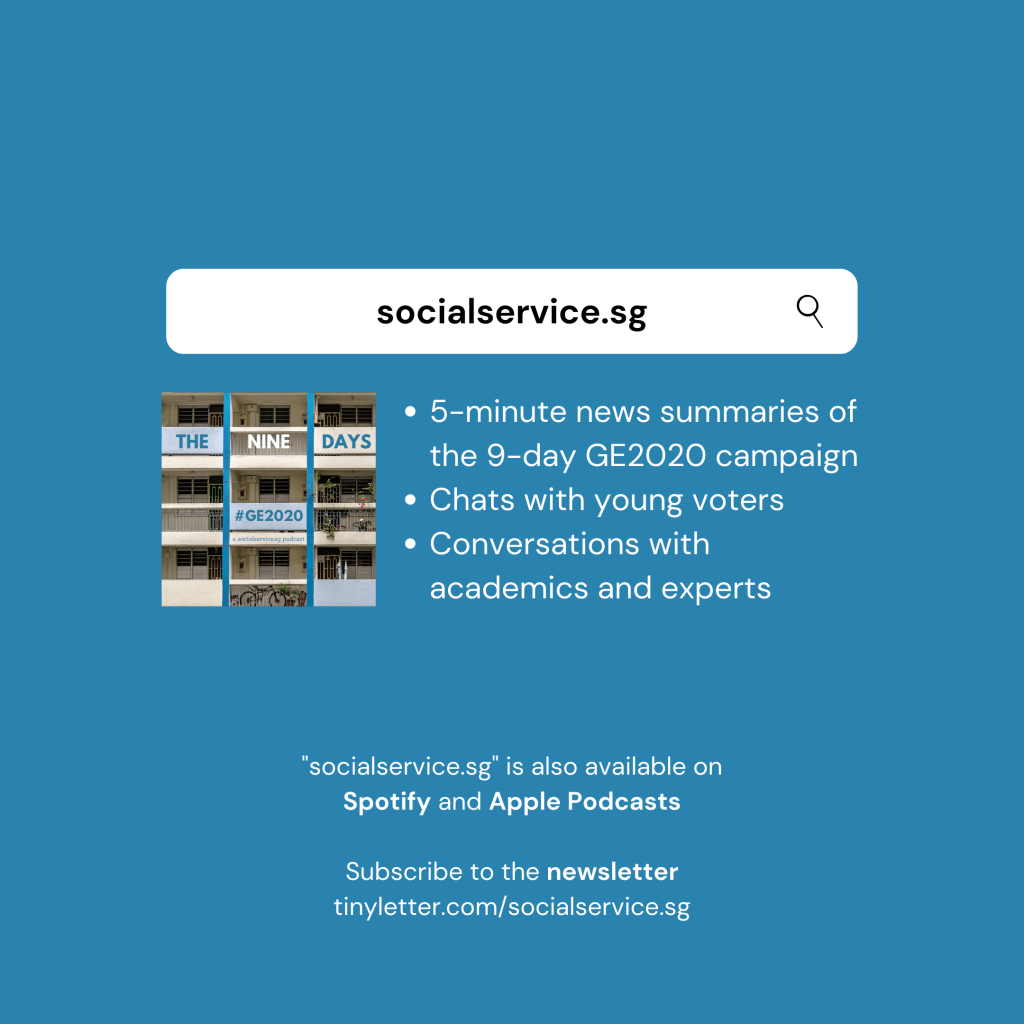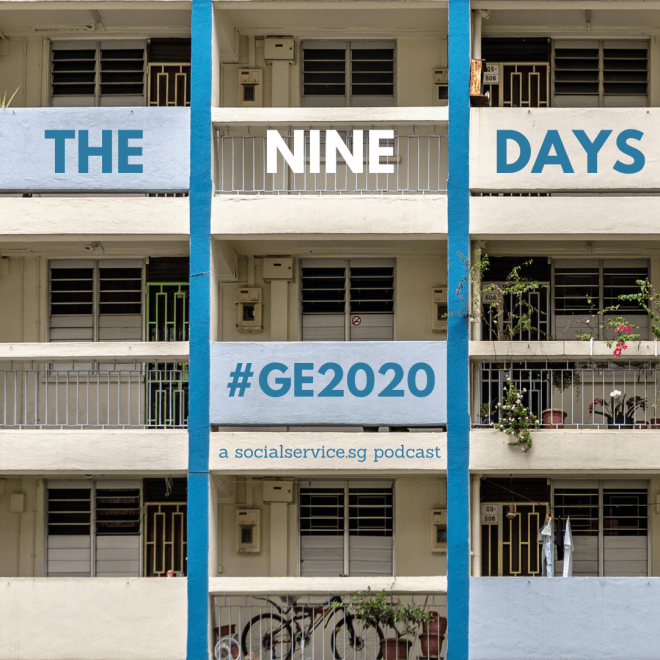The Nine Days is a socialservice.sg podcast covering the 2020 general election in Singapore (#GE2020), through daily five-minute news summaries, conversations with young voters, and interviews with academics and experts.
- Listen to today’s episode.
- Listen to other episodes on Anchor, Apple Podcasts, or Spotify.
- Check out the full list of episodes.
Subscribe to the monthly socialservice.sg newsletter and check out the socialservice.sg podcast!

Singapore's opposition parties: The WP, PSP, SDP, and coalitions of electoral losers (with author Loke Hoe-Yeong) – socialservice.sg presents: "Before the Ballot"
GE2020 disappointment
I am disappointed with the overall general election. It was a missed opportunity not to have substantial, substantive discussions about our socio-economic and social welfare policies.
It is true that a focus on personalities and politics will always dominate an election. However, the difference is that we are still in the middle of a global pandemic, which surfaced many gaps and inequalities in Singapore.
Let us not forget too, that even before the pandemic, advocates / activists / researchers / academics / Singaporeans, many of them have been highlighting the challenges of low-income families, of homelessness, of the importance of a living wage. These were ongoing discussions in the past five years. That these issues did not more fully inform this election is disingenuous in my opinion.
I have three hypotheses for this disappointment.
You’ve heard the first one. The absence of the physical rallies, which usually dominate news headlines, has allowed the ruling party to set the agenda. And I would say it has done so fairly strategically. We’re always talking about the same issues: 10 million, NCMP, mandate.
The second is a communication divide. I’ll give you an example. When news about Workers’ Party candidate Raeesah Khan broke, the hashtag #ISupportRaeesahKhan started trending and was number one on Twitter for some time. Some of this spilled over to Facebook and Instagram, but I don’t think the hashtag or the trend made it to the mainstream media. I don’t think we’re even talking about closed social media groups, on WhatsApp or Telegram.
And third, it’s the complexity of issues. That to me signals the importance of civic and political engagement between the GEs. There is no way we can have a discussion comparing the Progressive Wage Model with the minimum wage in nine days. The government has plans to extend its wage model beyond the cleaning, security, and landscape sectors. But to which industries? A minimum wage sounds good, but how did the parties decide the amount? Based on a basket of goods or a basic standard of living?
So, in a way, I guess you could say that I set myself up for disappointment this election. But that doesn’t make the campaigns or the hustings any less disappointing.
Silver linings in a post-GE2020 Singapore
I want to make a quick note about the civic and political participation of young voters. In the last nine days, I’ve been having podcast conversations with young voters who are engaged in so many ways.
They volunteer with the political parties. They send emails and messages to the candidates in their constituencies. They run their own websites to increase socio-political literacy. They comb the manifestoes and watch the political broadcasts and the online rallies. And they assess where parties stand, on particular issues.
Now you might say, selection bias. I grant you that.
But these young voters are also generating content. They put voting and election resources on a platform. They tweet and post Instagram stories to raise awareness. They write long, thoughtful Facebook posts which go viral.
Now you might say, wait, that’s a social media bubble. Again, selection bias, confirmation bias, divide between the online and offline worlds. There is some truth in us seeing what we want to see. Fine.
But, they are also having conversations with their friends and families. Do I think these trends will translate into electoral results this election, maybe not?
Young voters are coming to age with so many tools at their disposal, and their enthusiasm gives me grounds for optimism. To me, the work continues after July 10th.
So, what are the other silver linings?
- First, I hope all political parties continue to use their online platforms beyond GE2020. It took a pandemic for political and policy content to be more accessible and ubiquitous, so let’s keep that.
- Second, even in defeat or disappointment, the outstanding candidates can still champion their causes and advocate for change in many ways.
- And third, we are starting to appreciate the importance of socio-political involvement between the elections. Let us work to create more discursive spaces, centring on the lived experiences of individuals and communities, especially the disadvantaged and the marginalised.
Thank you sticking with me through the nine days. On Cooling-Off Day, be sure to check out the list of episodes on socialservice.sg, of my interviews with young voters as well as academics and experts. You can also subscribe to the newsletter at tinyletter.com/socialservicesg.


One thought on “#GE2020 Silver Linings in a Post-GE2020 Singapore (Day 09)”